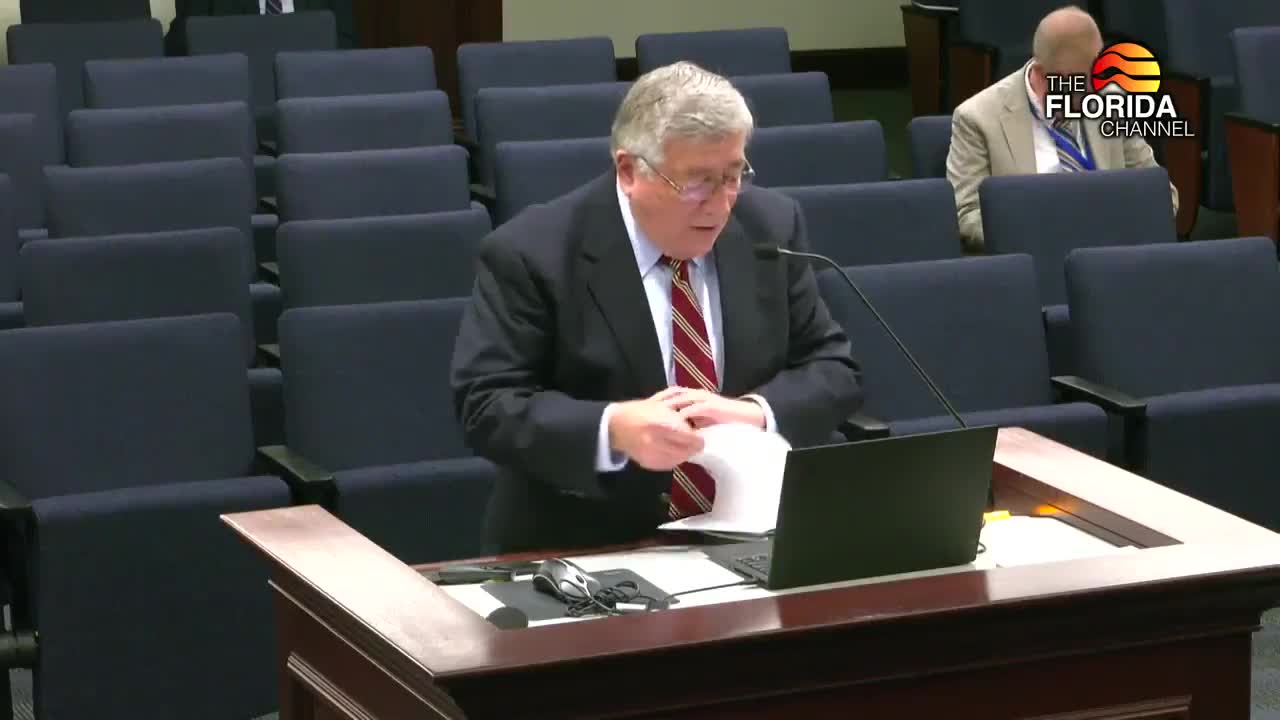Senate Bill 108 overhauls Florida rulemaking, sets review schedules and reporting deadlines
Get AI-powered insights, summaries, and transcripts
Subscribe
Summary
The Committee on Governmental Oversight and Accountability heard a presentation summarizing SB 108, which tightens deadlines and creates a systematic review of state administrative rules, requires publication steps and increases transparency for licensing time frames.
The Committee on Governmental Oversight and Accountability met for a presentation on Senate Bill 108, which the presenter described as the most comprehensive update to Chapter 120 in about 20 years.
Ken Plant, coordinator for the Joint Administrative Procedures Committee, told the committee that SB 108 — signed by Gov. Ron DeSantis on June 27, 2025 — establishes concrete deadlines and a multi-year review schedule intended to ensure agency rules implement statutes as intended and to make licensing times more transparent.
Plant said the law requires a notice of rule development to be published in the Florida Administrative Register within 30 days after the effective date of a law that requires rulemaking, and that a notice of proposed rule must follow within 180 days of the rule-development notice unless the Legislature sets a different date. Agencies that cannot meet the 180-day deadline must submit a concise statement of reasons to the Joint Administrative Procedures Committee at least seven business days before the deadline. The committee must post, within 15 days after the end of each calendar year, a list of agencies that missed the 180-day deadline and include links, citations and the agency's explanation.
Plant also described changes to emergency-rule practice. Under SB 108, emergency rules that are intended to protect the public interest and are adopted pending ratification of a proposed rule will expire at adjournment of the next regular legislative session if the proposed rule is not ratified. Emergency rules must be published in the Florida Administrative Code, and renewals of emergency rules must be published in the Florida Administrative Register before the rule's expiration date with facts justifying renewal. Agencies may supersede an emergency rule with another emergency rule, but the superseding rule may not remain in effect longer than the original rule's effective period. Technical changes to an emergency rule are allowed within seven days of adoption, and short-term emergency rules tied to executive orders may be repealed before expiration by publishing notice in the Administrative Register.
Plant described the bill's mandated rule-review schedule: agencies must develop regulatory plans by Oct. 1, 2025, listing all existing rules and a five-year schedule that reviews at least 20% of numbered rules each year. Agencies must review all rules adopted before July 1, 2025, by July 1, 2030, with rules adopted after July 1, 2025, reviewed in the fifth year after adoption. By Jan. 1, 2026, agencies must submit summaries of intended action for rules under review to the Senate president, House speaker and JAPC; by April 1, 2026, and annually thereafter, agencies must submit to JAPC the action intended for each rule slated for review. JAPC must complete its reviews and the Department of State must publish notices and update history notes in the Florida Administrative Code when reviews are completed.
Plant said agencies issuing licenses must begin tracking compliance with statutory licensing time frames starting Oct. 1, 2025, and include licensing processing information in regulatory plans beginning Oct. 1, 2026. JAPC will consolidate and publish licensing-time reports annually in the Florida Administrative Register.
Chair Mayfield and committee members asked no substantive technical questions following the presentation; Mayfield thanked Plant and noted that committee oversight would be important to keep agencies on schedule.
The presentation was informational; no action or vote on SB 108 was taken during the meeting.
SB 108 represents a statutory change in process rather than a discrete program appropriation; implementation will depend on agencies' reporting and JAPC's compilation work going forward.
